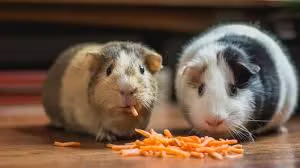A Guide to Guinea Pigs: Breeds, Housing, Diet, and Grooming

Author: Vejay Anand
Guinea pigs are beloved pets, especially among families, owing to their delightful personalities. They are social, follow a daytime routine, and are generally gentle, even in stressful situations. Guinea pigs require spacious enclosures, opportunities for exercise outside their cages, and a diet rich in vitamin C and roughage.
Guinea pigs have an average lifespan of 6 to 8 years and weigh approximately two to three pounds. They are available in various colors and make excellent companions for children and adults. If you are considering adopting one, there are some essential aspects of guinea pig care that you should know about. Let's explore them together.
Breeds: Did you know that there are hairless guinea pigs? Around a dozen guinea pig breeds, such as texels, coronets, and Baldwins, are distinguishable by their coat types, including some that lack fur altogether.
Housing (Cages): Guinea pigs need more space to roam than is often provided. You can buy larger cages online or at pet stores or create a custom enclosure using small fencing or pens to ensure your guinea pig has plenty of safe play space. However, your guinea pig will appreciate some supervised free-roaming time even with a spacious cage.
Bedding: Guinea pigs have a habit of urinating or defecating wherever they want. Therefore, using absorbent bedding that is safe for your pet is essential. Traditional bedding options such as wood shavings, particularly cedar shavings, have lost their popularity due to the potential harm they can cause to pets. Some popular alternatives available in the market are reusable fleece, which can be easily purchased from craft stores, and various types of paper-based small animal bedding.
Diet (Feeding): Guinea pigs, like humans and capybaras, require vitamin C in their diet as they cannot synthesize it independently. It is essential to provide them with a diet that includes vitamin C supplements and high-quality guinea pig pellet food to meet this dietary need. While guinea pigs need ample roughage, such as timothy hay, they should avoid sugary treats and seeds that can lead to gastrointestinal problems.
Grooming: Does your guinea pig need a bath? How do you trim their nails? Grooming your guinea pig correctly is crucial, including using safe shampoo for cleaning. No need to fret about brushing their teeth, but monitoring dental health is essential. Guinea pigs' teeth grow continuously and may become overgrown, causing pain and appetite loss. Trimming or removing green teeth may be necessary, but your guinea pig will never require such procedures.

